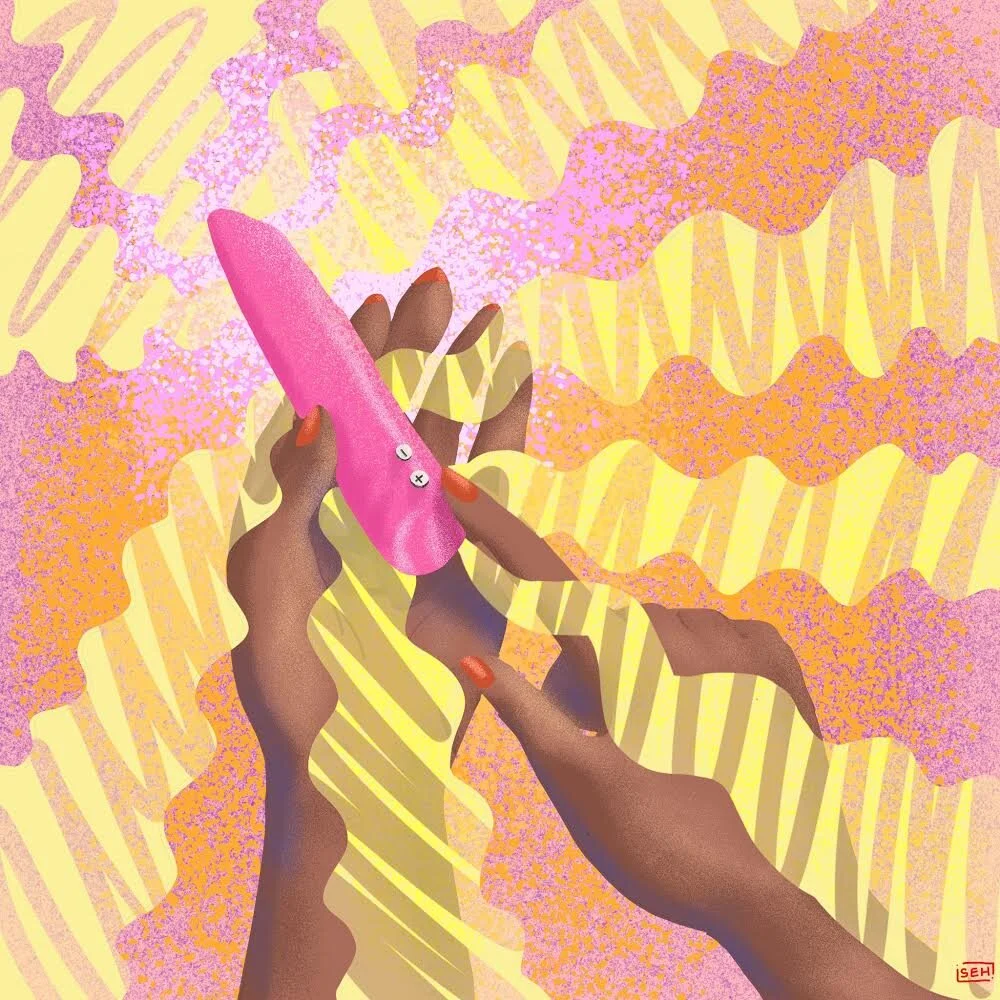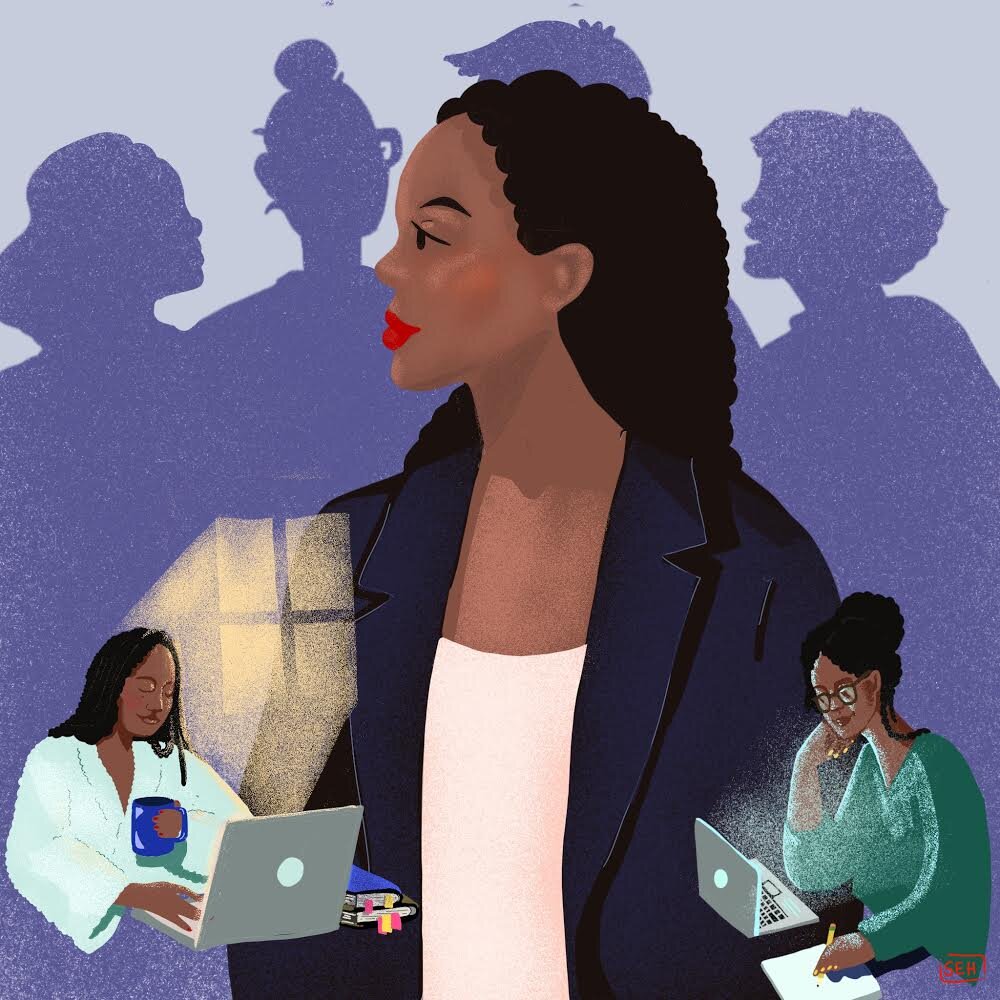Orgasmic Living — An Essay by Afrosexology Co-creator Dalychia Saah
YOUR best friend and college roommate giddily hands you her newly purchased vibrator. It’s the first sex toy you’ve ever held and you don’t know why it makes you feel deeply uncomfortable. You try and match her level of excitement, but you can’t hide your judgment as you slip out comments about not needing toys and your preference for the real thing.
After years of hopeful wishing and disappointing sex, you invest in a vibrator of your own. It’s a small pink lipstick shaped clitoral vibrator. And still, it intimidates you. Apparently growing up in a house where you went to three churches most Sundays still leaves you with some masturbation shame, despite being agnostic since you were 7 years old.. You guide the vibrating plastic toy to your clitoris.
Overwhelmed, you breathe through your initial fear of peeing on yourself and then your fear of exploding until finally you bring yourself to orgasm. Your hastened exhales mix with jolts of laughter as you announce - “Now that --- is --- an orgasm.” You didn’t know your body was capable of feeling this much pleasure. You feel your mind trying to process what your body already knows - that you don’t have to depend on a lover to give you the pleasure you can give yourself. You think about what other conspiracies you’ve believed. You wonder if you can accept your own power and freedom that white people have tried to deny/denounce. You take a deep breath, grab a glass of water and masturbate again.
YOU’RE the only Black person on a team of 5. You took the job because A) You needed it after grad school and B) They offered more money than you or your fellow social workers were making, even though they were barely paying you anything at all. The job description included tasks that were challenging but doable. What the job description did not include was the additional emotional labor of performing and providing emotional intimacy for your white co-workers. Because you are with them 8 hours a day, 40 hours a week, 2,000 hours a year, they believe you are close friends. You’re pressured to disclose more than you’re comfortable sharing when they ask entitled and invasive questions like, “What does your last name mean?” or “What does your family think about you being a sex educator?” or “What’s the biggest challenge in your polyamorous relationship?” They pester you for advice and comfort on issues with their friends, partners, and family. They press you for your thoughts on looting, all lives matter, “black on black crime”, and Trump being president. They insist that they are not racist even when they say things like, “Maybe if you chose to see yourself as a soul instead of a Black woman, you wouldn’t be oppressed ”
You’ve created a passion project with a friend from grad school. You desperately want Black people to know how good they could feel in their bodies. You talk to friends and strangers about masturbation, pursuing pleasure, and reclaiming their erotic power and body agency. Daily, you jump out of bed at 4am to eagerly work on your side business. For months, you push through this exhausting yet exhilarating dance. 4 to 8, 9 to 5, 6 to 11, sleep and repeat. You sacrifice happy hours with friends, quality time with partners, and good sleep to balance your full time job and building your dream business. At first it’s manageable. Your non-profit co-workers even support your side hustle. You brag to your friends that as long as you get their work done, they don’t care where or when you do it. Your boss allows you to work remotely, which allows you to travel and facilitate workshops on unpacking masturbation shame. And there are days you’re genuinely grateful for your flexible work environment and growing sex positive platform.
But you eventually know you have to leave this job. You can no longer take the micromanaging and the microaggressions. The contrast continues to grow between how your day job compared to your sex ed work makes you feel. And soon your 9-5 drains so much out of you, you have no more passion to pour into your project.
You quit and some very concerned people ask you, “What are you going to do with your life?” You cheekily respond, “I don’t know what I want to do, but I know how I want to feel.”
YOU feel lonely and lost. This is not new. You remember a conversation you had with your dad. Your immigrant dad who survived Liberia’s poverty, learned to read, write, and speak Hebrew when he was a doctor in Israel, and went back to medical school when he was told his degree didn’t mean shit in America. You tell your dad you want to take a year off before grad school because you’re depressed. Your dad simply acknowledges your naive request and says, “You’re Black, life is depressing.” You’re learning his truth the hard way, but you hope there is another path. You don’t know what direction to go, so you go in.
YOU take note of what flows naturally and what feels forced. You reconnect with your love of music and make several playlists that you take daily twerk breaks to. You decide you need more play in your life and buy puzzles, bubbles, and watercolors. You light candles, diffuse jasmine, pay attention to your dreams, masturbate often, go on hikes, take more naps and more risks. You enroll in the pottery class you’ve always wanted to take, invest in your business and yourself, and ask for kinkier sex from your lovers.
You learn that there are practices, people, and places that make you feel open, authentic, erotic, creative, energized, joyful, pleasured, connected, expansive, liberated. And there are ones that make you feel shamed, coerced, belittled, insecure, critical, hostile, and hurt. You start doing erotic evaluations using a scale you haphazardly create. At one end of the spectrum you write abusive, and on the other you write a word that represents the most magical feeling you’ve experienced - orgasmic.
You do these internal quizzes throughout your day.
After sexual experiences you assess if you feel:
A) Used
B) Satisfied
C) Orgasmic
As you’re eating you take note of if the meal makes you feel:
A) Disgust
B) Content
C) Pleasure
As you leave after hanging out with friends, you ask yourself if the interaction left you feeling
A) Exhausted, Insecure, Uncomfortable
B) Neutral
C) Energized, Inspired, Affirmed
As you take stock of your life patterns become apparent. You make the choice to confront your people-pleasing tendencies, poor boundaries, and conflict-avoidant personality. You have challenging and overdue conversations with friends, lovers, and family members. Through trials and therapy you develop tools to replace coping mechanisms that no longer serve you. You stop shaming yourself about the decisions you’ve made and the desires you have. You bask in the freedom of saying no and the joy of a deep, full body, orgasmic yes. Yes to prioritizing people, places, and practices that bring you pleasure. Yes to trusting, affirming, loving, protecting, and re-parenting yourself. Yes to actively building a life and world that moves from feeling oppressive to orgasmic.






